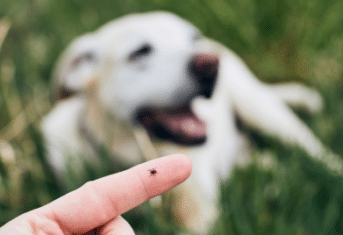Bedbugs and Pets

Bedbugs and Pets
A few weekends ago, I was volunteering at The AMC's "Ask the Vet" booth during AKC's Meet the Breeds show at the Jacob Javits Center in New York City. A pet owner came to the booth with questions about bedbugs and pets. I know there is a nationwide epidemic of bedbugs, but in veterinary school parasitology, I remember learning bedbugs are a nuisance to humans not animals. I decided to do some reading and here is what I found.
First, a bit about bedbug biology. They belong to the family Cimicidae and are flightless, so they crawl to their host. Like most parasites, bedbugs are very specific in their choice of host. And fortunately for your pet, bedbugs prefer people over pets. The blood of humans, dogs and cats is different and bedbugs have evolved to feast on human blood. Bedbugs climb on their host only to feed and spend the rest of the time in mattresses, furniture and crevices. As nocturnal creatures, they feed at night, attacking their sleeping host, hence their colloquial name bedbug. For more information on bedbug biology from entomologists (bug experts), go to https://www.oasas.state.ny.us/AdMed/FYI/bedbugs.cfm.
Bedbugs live in environments, not on pets or people, and can easily be confused with other household bugs. If your pet has critters crawling in its fur, black specks deposited on its blanket and is scratching up a storm, most likely your pet has fleas, not bedbugs. This time of year when the weather gets cold, fleas are looking to move indoors and you might be more likely to see them in your house.
If you do discover bedbugs, there are a few things you can do to decrease the number of bedbugs in your home. Wash bedding in hot, soapy water and dry them in a hot dryer (>120 degrees F). Vacuuming thoroughly and discarding the bag after each vacuuming session will help decrease bedbugs in the environment. Ultimately, most people need a professional exterminator to clear the bedbugs from their home. For more information on eradicating bedbugs from your home, go to https://www.nyc.gov/html/doh/downloads/pdf/vector/bed-bug-guide.pdf.
If you use the services of a professional exterminator, follow his directions explicitly. Keep in mind, insecticides are common causes of toxicity in pets. Insecticides used in the treatment of environmental bedbugs are generally safe for pets if used properly.
If your pet has previously experienced reactions to flea and tick preventatives, check with your veterinarian to determine if the product your exterminator recommended is safe for your pet.
This blog and many others may be found in the "Tales from the Pet Clinic" blog from WebMD.
_________________________________________________
For nearly a century, The Animal Medical Center has been a national leader in animal health care, known for its expertise, innovation and success in providing routine, specialty and emergency medical care for companion animals. Thanks in part to the enduring generosity of donors, The AMC is also known for its outstanding teaching, research and compassionate community funds. Please help us to continue these efforts. Send your contribution to: The Animal Medical Center, 510 East 62nd Street, New York, NY 10065. For more information, visit amcny.gbtesting.us. To make an appointment, please call 212.838.7053.
































